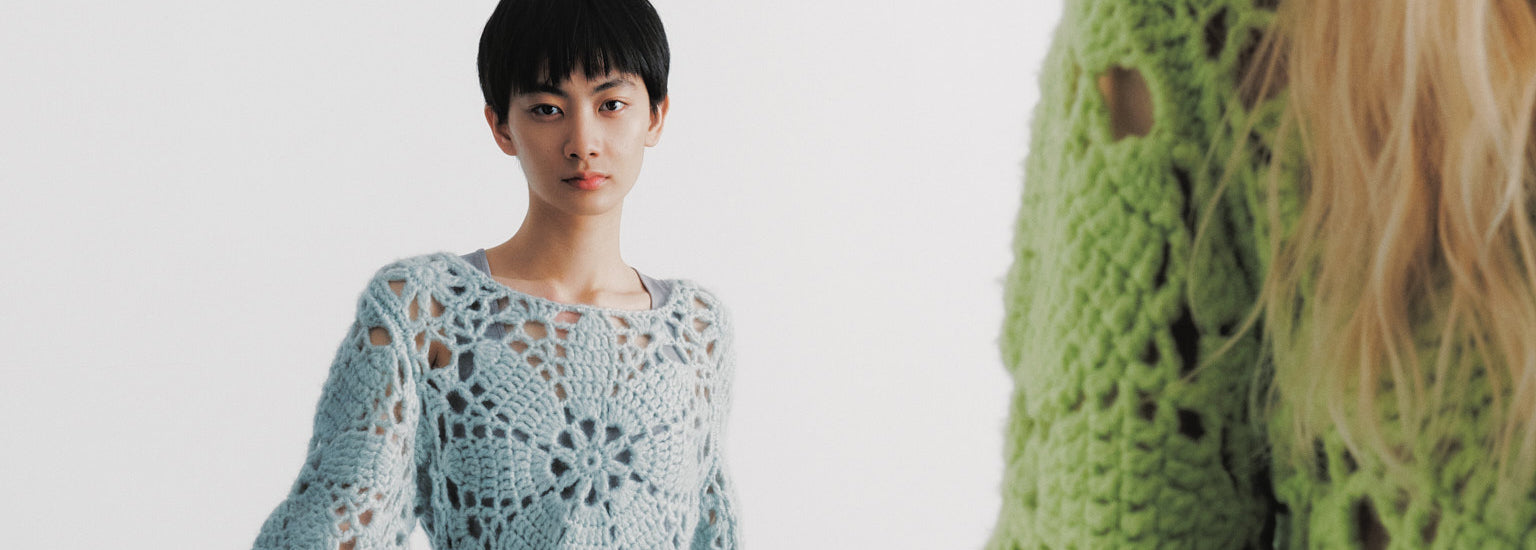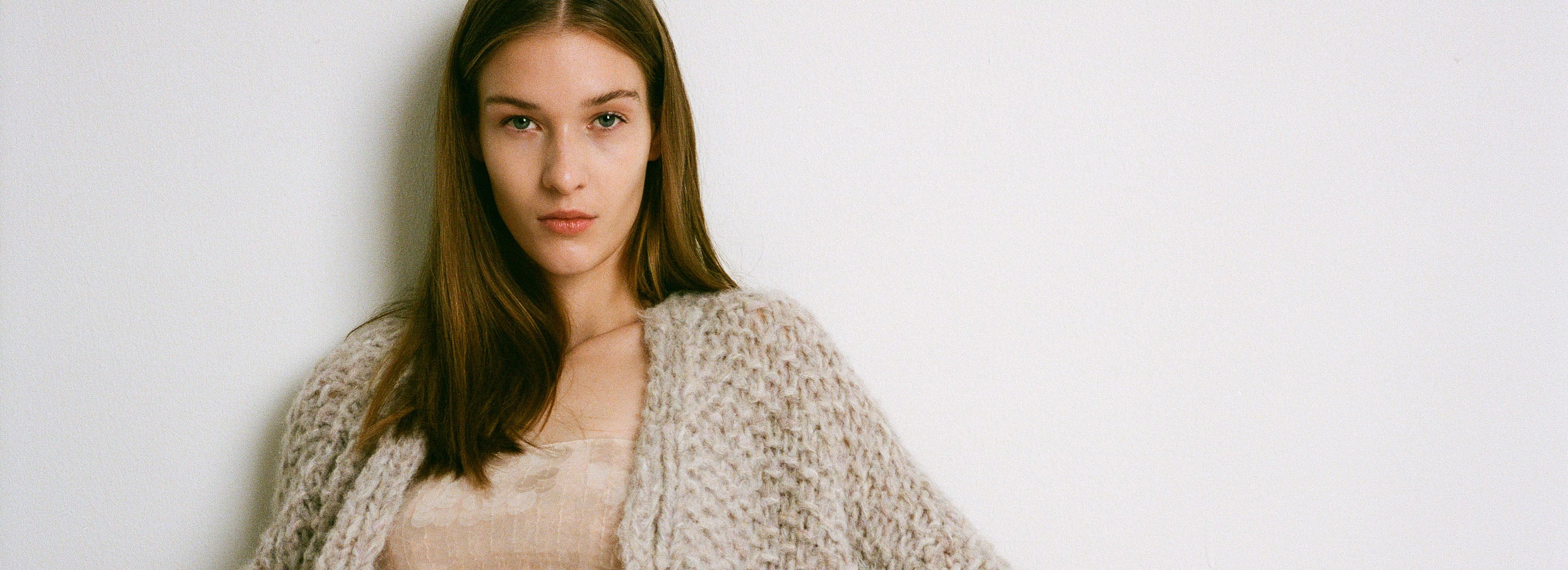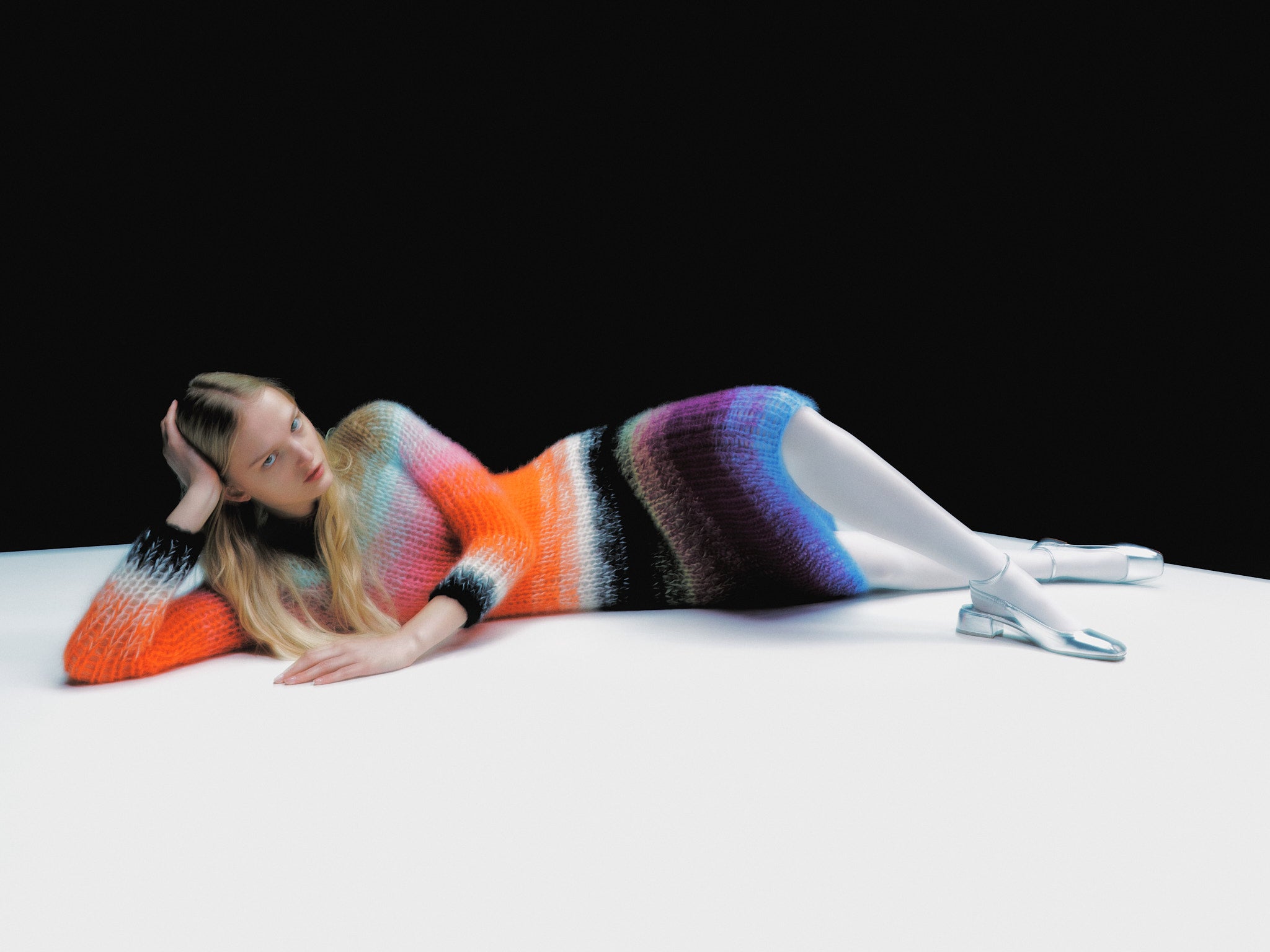
Empowerment: liberty through knitting
At Maiami, we are aware that how we operate has an impact and we know that we are responsible for optimising it. We have identified four key responsibilities that are close to our hearts: Empowerment, Environment, Resources and Longevity.
In 2023, we decided to push our efforts in regard to Empowerment (for the other three pillars, please see our Responsibility Report).
Our products are brought to life by the craftspeople who make them. Each handmade piece is manufactured by one person, from the first loop to the finished product – the opposite of mass production. With our business, we help invigorate and strengthen mostly rural communities around Europe.
One example: Udružene, a company in the heart of Sarajevo, the capital of Bosnia Herzegovina, that gives work to 350 hand-knitters around their country – giving them the opportunity to gain liberty and independence in a patriarchal society.
We went to Sarajevo to meet Nadira Škaljić Mignasson, the founder and chairwoman of Udružene, and her team to find out more.
Maiami: When did you start with Udružene?

I met a woman in Sarajevo in 2000, when I came here with my first son. She sold hand knitted sweaters in the street, and I bought one for my baby. I started to talk to her, she was a refugee from Eastern Bosnia. She lost her son. I was a young mother, my son was only two months old, so this story touched me a lot. In the beginning the knitting was like a psychological treatment for her, and then it became a business – that was the trigger for me to start this project.
Maiami: What is the situation for women in Bosnia?
Nadira: Not only in Bosnia, but in many Balkan countries, we have extremely patriarchal societies. 40 percent of the people here are without a job, out of these 40 percent, 70 percent are women. I thought, I am in the fashion business and it is really beautiful what the women here can do – by combining arts and crafts I could maybe do something to improve the situation of the women here.
They take care of their kids, their family, their homes. Only women from bigger cities like Sarajevo and Tuzla have an education, the prospect to get employment and earn an income to build their future, to gain liberty and freedom. Women in rural areas usually don’t get these opportunities. In addition, the infrastructure is bad, they can neither travel nor do most of them have a driver’s license.

A lot of them get taken out of school by their families when they are ten years old. They see their brothers continue education, and maybe that brother isn’t even very interested in school, but they get the opportunities. It makes the girls loose their confidence.
But they are brave, they have a lot of courage, only society doesn’t give them the opportunity to show their skills – and they know they could do better. With this project, we give them the opportunity to prove it.
Maiami: What motivates the women to work for Udružene?
Nadira: I took a survey among them and I thought money would be their first motivation, but no – finally they feel useful for their family, in another way than only being the mother or sister. When they provide, they have a voice in their family, they get heard. Most of them invest what they earn in the education of their daughters.
I know how courageous they are, how many tragical situations they had to go through. They lived through the war, they were the ones who took care of the family when the men were on the battlefield. Of course they did it with pride but nobody ever thanked them for it. Without their support their men couldn’t have gone out to fight for our country. In addition, many of them are victims of sexual abuse or domestic violence.

They would never say I want you to talk about me, but I see it when I put their names on hangtags or when you come to take pictures and when we talk about what they achieved – they are proud of it, it makes them happy.
They can choose to work alone from home but many like to work together. One of them told me, she had to stop school to take care of her younger siblings. She never had any time to herself, the only moment that is a relief for her is when they meet to knit and spend time together. I think this is exemplary for many of the others. They can share their experiences and they don’t feel alone. Belonging to this community makes them feel stronger.
Maiami: How did you realise you wanted to take action to empower women?
Nadira: My mother raised me alone, my parents divorced and I lost my brother when I was very young. It was only the two of us from 18 on, and I saw how difficult it was in former Yugoslavia – even though my mother was a doctor who had an education. But it was still hard for her, to be recognised by society.
Later, when I was alone in Paris, I learned first hand that it’s much more difficult for a girl than for boys to find their way to be heard and seen as a human being. Gender equality is definitely something we need to work on, this is something that is really important to me.

And when our ladies tell me that they gave the first money they made here to their girls to finish their studies – these are the biggest achievements, this is the reason why I am doing this.
By law, men and women are equal but not in practice. The government doesn’t want it and women here are a bit shy because of the patriarchal history. The situation is changing but I think it will take another 20 or 30 years – that’s how long I think we’re behind countries like France, Germany or other western countries.
I know that I cannot make bigger changes, because it is a political decision, to not include more women in government, in decision making processes etc. But by means of our project, I can change what is in my power.

Nihada
Nihada lives together with her two daughters, Saudina who is 14 and Sedina who is 19 and has special needs. Saudina already has a brown-black belt in Karate (there is only one more level, the black one) and is eager to learn English. “The destiny of my older daughter is set. So I want to make sure my younger daughter has as many options as possible in her life.” Knitting is her means to do this. What should the world know about Nihada? “I am fighting for my children.”

Dula
“I found friends at Udružene. I go there to pick up new material and to drop off what I finished. We often have a chat. I’m really enjoying this kind of work.” Dula takes care of her house, where she lives with her son. The knitting is a side job, she knits two pieces per week. Is the money important? “Also, but firstly it’s my love for knitting.” Dula even talks to her knitting needles, tells them off when something goes wrong. She learned the craft from her mother when she was ten years old. What should the world know about the women of Bosnia? “Bosnian women are ambassadors for our tradition”, including the art of knitting.

Haska
“Working for Udružene means a lot to me. It gives me security, it makes me feel grounded. It is something that I can count on, hold on to.” Haska started working for Udružene in 2018 and she knits four to five pieces per week. She learned knitting from her mother and likes the challenge of learning how to knit new styles. What should the world know about the women of Bosnia? “You cannot describe the Bosnian women, in Bosnian women you will find everything.”

Merima
“I learned all the crafts as a child from my grandmother during the war because we couldn’t go outside. It was kind of like playing, so we knitted socks and sweaters.” Merima lives together with her sister Amina. She is a handicraft wiz, churns out up to seven pieces per week. “The economic support is one motivation, but I do what I do because I love it.” Once she took on a challenge all other knitters didn’t think was possible, to create a particular piece within a day. A nightshift later it was done perfectly. What should the world know about the women of Bosnia? “We are fighting with all our powers to survive. No matter of life’s obstacles, we always see the light at the end of the tunnel.”
About Udružene
Udružene was founded in 2012 by Nadira Škaljić Mignasson. The company’s headquarter is situated in the centre of Sarajevo, the capitol of Bosnia Herzegovina. From here, Udružene is run by Nadira and her all female core team. This is where orders from their clients are processed and allocated to the knitters that live throughout the country.
The company gives work to more than 350 hand-knitters around the country of Bosnia Herzegovina. In rural areas, many girls are taken out of school when they are ten years old. Knitting is often the only option for them to earn their own money and gain some independence in a rather patriarchal society.
Click here for a selection of styles that were knitted in Bosnia Herzegovina.
Image Credits
Collection pictures Charlotte Hansel
Sarajevo pictures Tina Linster


